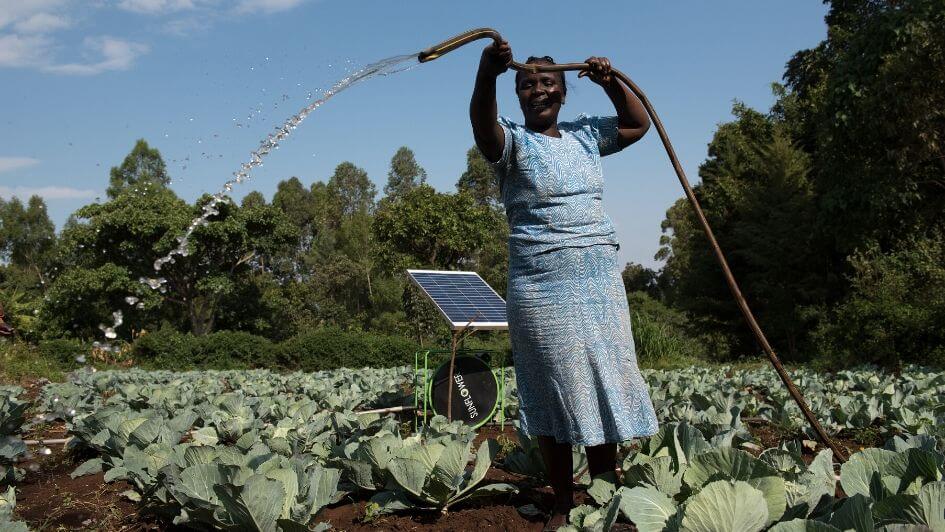Water pumps, powered by solar energy, have generated huge interest and excitement in the Global South. Considered as a ‘new green revolution’ in farming practices, solar-powered irrigation systems seem to offer a solution to the ‘water-energy-livelihood’ dilemma – how we can improve poor farmers’ livelihoods, without compromising the environment. The World Bank[1] and the UKAid[2] have been playing an active role in promoting innovation, among others. Despite the promises and a high level of optimism, many questions remain unclear: how can we avoid the over-extraction of underground water? Do female farmers equally share the fruit of success? This article will explore the knowledge gaps and examine what we know about the impact of the innovation so far, and what we don’t.
-
Locally produced clean energy supplies are necessary since many countries in the Global South lack reliable electrical grid connections. Irrigation makes farmers more resilient against erratic rainfall patterns. Small-scale, off-grid energy and irrigation interventions are very tempting. However, whether solar-powered systems are suitable, depends on local contexts. A holistic approach to irrigation policy is crucial to success. The hydrological cycle and crucial factors such as rainfall; surface and underground water; soil moisture and evaporation; land use characteristics, such as size and ownership; as well as market structures, all need to be taken into account.
-
Diesel fuel should be replaced by clean energy, such as solar since diesel is harmful to the environment. Furthermore, it has been unfairly subsidized by many governments. However, solar pumps are not necessarily environmentally friendly. Research has identified issues with the over-extraction of underground water by solar pumps[3]. To address the water depletion issues, many scholars have underlined the importance of monitoring and regulating the water level. However, many countries in the Global South have been suffering from poor governance. How to achieve effective enforcement remains unknown. Some advocates have proposed solutions, such as communal monitoring or smart taxing policies, to control farmers’ water consumption by imposing social and economic sanctions. Yet, these suggestions have yet not been properly tested. It is not clear if they will alter farmers’ water consumption behavior. Another concern refers to e-waste.: increasing demand for landfills and health implications of toxic materials, such as lead and cadmium in PV modules have cast doubts on the long-term environmental sustainability.
-
Poor farmers are nowadays more likely to afford solar pumps than diesel-based mechanisms since the prices of photovoltaic panels have been dropping. Furthermore, irrigation helps boost farmers’ incomes and productivity. However, in order to purchase solar pumps, farmers are encouraged to take up loans or join the micro-credit systems. These suggestions may, however, risk increasing poor farmers’ financial burden. Additionally, maintenance and post-intervention service support play a crucial part in determining the long-term success of the interventions. Little research has yet touched on these issues.
-
Farmers would benefit from solar pumps in the long term because they help increase farm productivity and incomes. The majority of the literature has suggested that farmers switching to solar pumps have witnessed an increase in crop production[4]. Yet, how the increasing incomes are distributed within villages and households needs to be scrutinized. Research suggests that, whether solar pumps necessarily create socially inclusive outcomes depends largely on the negotiation of different stakeholders. Women, for example, tend to have lower access to water, information, and credit than men do. They are more likely to be deprived of land rights, which would affect their decision-making power. Therefore, the use of solar pumps could help reinforce existing unequal social structures[5].
To conclude, this article does not rule out the transformative potential of decentralized solar-powered pumps in developing countries. However, some tricky issues such as underground water over-extraction; e-waste collection; maintenance and post-intervention service support; and gender inequalities could play a key role in determining whether solar pumps would achieve the three pillars of sustainability simultaneously: economic, environmental and social issues. Solar pump advocates and skeptics should, therefore, work together and find out the answers and solutions to the uncertainties identified.
References
[1] The World Bank claims that solar-powered irrigation is proven to be ‘operationally, financially and environmentally sustainable’ (World Bank Brief, 2017, www.worldbank.org/en/topic/water/brief/solar-pumping)
[2] UKAid (2019) Solar water pump. Technology roadmap.
[3] FAO (2018) The benefits and risks of solar-powered irrigation –a global overall. Rome: FAO
[4] Wong, S. (2019) Decentralised, off-grid solar pump irrigation systems in developing countries – are they pro-poor, pro-environment and pro-women?; in Castro, P., Azul, A., Leal, W. and Azeiteiro, F. (eds.) Climate change-resilient Agriculture and Agroforestry: Ecosystem Services and Sustainability. Berlin: Springer. Chapter 21, pp367-382.
[5] Sinyolo et al. (2018) ‘Gender differences in water access and household welfare among smallholder irrigators in Msinga Local Municipality, South Africa’, Journal of International Women's Studies, 19(5), 129-146.
Sam Wong (Ph.D.) is an Assistant Professor of Human Geography at University College Roosevelt in Middleburg, The Netherlands. Sam can be reached at
